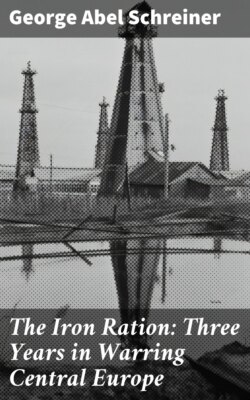Читать книгу The Iron Ration: Three Years in Warring Central Europe - George Abel Schreiner - Страница 9
На сайте Литреса книга снята с продажи.
ОглавлениеPhotograph by Underwood & Underwood, N. Y. PROVING-GROUND OF THE KRUPP WORKS AT ESSEN The guns shown represent types of artillery used in modern warfare on land and sea.
About the same time I was able to ascertain that in the rural districts of Germany little economy of any sort was being practised so far, though the establishing by the government of Fodder Centrals was warning enough. The farmers sat at the very fountainhead of all food and pleased themselves, wasting meanwhile much of their substance by sending to their relatives at the front a great deal of food which the men were in no need of. The German soldier was well fed and all food sent to him was generally so much waste. It was somewhat odd that the government should not only permit this practice, but actually encourage it. But the authorities knew as little yet of food conservation as did the populace.
So far the traffic incident to supplying large population centers with food had moved within its regular channels, the interference due to the mobilization duly discounted, of course. The ability of the Germans as organizers had even overcome that to quite an extent. There were delays now and then, but the reserve stores in the cities counteracted them as yet.
Normally, all men eat too much. The Germans were the rule rather than the exception in this respect. Most men weighed anything from twenty to sixty pounds more than they should, and the women also suffered much in appearance and health from obesity. The parvenu class, especially, was noted for that. The German aristocrat is hardly ever stout—hallmark of the fact that he knows how to curb his appetites.
Before the war most Germans ate in the following manner:
Coffee and rolls early in the morning. A sort of breakfast about nine o'clock. Luncheon between twelve and one. Coffee or tea at about four in the afternoon. Dinner at from seven to eight, and supper at eleven or twelve was nothing unusual. That made in many cases six meals, and these meals were not light by any means. They included meat twice for even the poorer classes in the city.
Six meals as against three do not necessarily mean that people addicted to the habit eat twice as much as those who are satisfied with sitting at table thrice each day. But they do mean that at least 35 per cent. of the food is wasted. Oversaturated, the alimentary system refuses to work properly. It will still assimilate those food elements that are the more easily absorbed, which then produce fat, while the really valuable constituents are generally eliminated without having produced the effect that is the purpose of proper diet.
It was really remarkable to what extent in this case an indulgence became a reserve upon which the German government could draw. A good 35 per cent. of all food consumed need not be consumed and would to that measure increase the means of public subsistence available.
I am inclined to believe that the enemies of Germany overlooked this fact in the computation of elements adduced to show that, within six months from the outbreak of the war, famine would stalk the land. The Entente economists and politicians counted on actual production and consumption in times of peace and failed to realize that a determined people, whose complete discipline lacked but this one thing—economy in eating—would soon acquire the mind of the ascetic.
It was not easy to forego the pleasures of the full stomach, since in the past it had generally been overfilled. But, as the Germans say, "When in need, the devil will eat flies."
Upon this subject the Prussian and other German state governments concentrated all their efforts in November of 1914. A thousand methods of propaganda were used. "Eat less," was the advice that resounded through the empire. I do not think that, unsustained by government action, the admonition would have helped much in the long run, though for the time being it was heeded by many. It was the fact that the end of the war seemed not so imminent any longer which furnished the causa movens for the saving of food. The war spirit was still very strong and the Germans began to resent the assertion of their enemies that they would be defeated by their stomachs, as some learned university professors insisted at the time. Not the least value of the propaganda was that it prepared the German public for the sweeping changes in food distribution which were to come before long.
